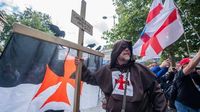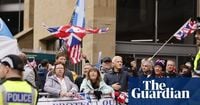On September 20, 2025, the heart of Glasgow became a flashpoint for the United Kingdom’s ongoing debate over immigration, identity, and the boundaries of protest. Hundreds of anti-immigration protesters and anti-racist counter-protesters converged on Buchanan Street, one of the city’s busiest shopping thoroughfares, in scenes that were both tense and deeply symbolic of the larger political and cultural rifts currently gripping Scotland and the wider UK.
The demonstration unfolded just a week after London hosted what several outlets described as the largest far-right rally in decades, orchestrated by the controversial activist Stephen Yaxley-Lennon—better known as Tommy Robinson. The echoes of that London event, titled the “Uniting the Kingdom” rally, reverberated north to Glasgow, where the city’s iconic statue of Donald Dewar, the so-called father of the devolved Scottish parliament, was surrounded by union flags emblazoned with slogans like “Stop the boats” and “Unite the kingdom,” according to The Guardian.
Further down the street, the mood was markedly different. Trade unionists, anti-racism campaigners, and Palestinian solidarity groups held up placards bearing messages such as “Bairns not bigots,” “Aye welcome refugees,” and “God hates fascists.” The counter-protesters’ ranks swelled with local residents, families, and activists, some of whom danced to pop hits blaring from a sound system that easily drowned out the speeches being delivered by the anti-immigration group. The soundtrack of protest ranged from Abba to Chappell Roan, lending the counter-demonstration a carnival-like atmosphere, even as tensions simmered.
The so-called “unity rally” at the steps of the Glasgow Royal Concert Hall had initially been promoted by local podcaster John Watt. However, Watt withdrew from the event at the last minute, citing “unforeseen circumstances.” His absence did little to diminish turnout, as groups like Save Our Future & Our Kids Futures—known for their opposition to asylum hotels in nearby Falkirk—mobilized their supporters to attend. Watt’s withdrawal came on the heels of revelations about his 2018 conviction for abusing two former girlfriends, as reported by the Daily Record.
As the afternoon wore on, the two camps—each corralled by police barriers—exchanged chants and jeers. The anti-immigration speakers struggled to be heard over the counter-protesters’ music and shouts of “shame on you.” The police, anticipating trouble, maintained a significant presence and eventually intervened to separate the groups when pushing and shoving began at the edges of the protest. Access routes for shoppers and tourists were temporarily closed, leading to a mix of alarm and irritation among passersby. In the aftermath, Police Scotland confirmed that a 47-year-old man was arrested for assaulting a police officer during the demonstration.
Amid the crowd, a trio of women held a banner with a portrait of Charlie Kirk, the far-right Christian activist who was assassinated in Utah two weeks prior. They praised Kirk for his outspoken views and lamented what they saw as a decline in Christian teachings in Scottish schools. “He wasn’t scared to say what other people are afraid to say,” one woman remarked, expressing concern about the perceived erosion of traditional values and the influx of other religions into the curriculum. Laura Dunsmore, a nurse among the group, insisted that the protest was about more than just immigration: “It’s about the state of the country, the state of the world. You can’t access healthcare, our streets are crumbling. We can’t vote our way out of this. We need change at a higher level.”
On the other side, the counter-protesters sought to reclaim the narrative around women and children, a theme often invoked by anti-immigration campaigners. Cat, a software technician from Glasgow’s Southside, cradled her baby while holding a sign that read “This mum welcomes refugees.” She explained her presence to The Guardian: “I felt I should lean in to the ‘mum’ bit especially because they are saying they want to protect women and children, and as a woman and a mum I’m not worried about asylum seekers. I’m far more worried about those guys over there.” For Cat and others, it was crucial to show solidarity in the wake of the previous weekend’s far-right rally in London.
The events in Glasgow did not occur in a vacuum. According to recent polling by More in Common, the anti-immigration Reform party is now running neck and neck with Scottish Labour in voting intentions ahead of the May 2026 Scottish parliament elections, though still trailing the Scottish National Party (SNP). For the first time, immigration has emerged as a top concern among Scottish voters—an issue compounded by the government’s ongoing struggle to provide adequate housing for refugees in Glasgow, as reported by The Guardian.
The protests also highlighted a new battleground over national symbols. In recent weeks, parts of Glasgow have been festooned with Saltires, Scotland’s blue and white cross, mirroring England’s Operation Raise the Colours movement, which has sought to reclaim the St George’s cross for nationalist purposes. This tug-of-war over flags and symbols has become increasingly fraught, with clergy members and faith leaders expressing concern about the co-opting of Christian imagery by far-right groups. As noted in The Sun, several clergy lamented the use of the cross during Tommy Robinson’s rallies, worried that its deployment in such contexts risked distorting its meaning and alienating people of faith.
Robinson himself remained at the center of controversy. After organizing the London rally, he attempted to travel for a break to Colombia, only to be detained at Bogotá airport and deported for being deemed a “threat to national security.” In a video posted to X, Robinson recounted, “I landed at Bogotá and what do you think happened? Detained, threat to national security, deported, spent all day in a detention room.” He was permitted to book a flight to Panama, but upon arrival in Panama City, was again detained and faced deportation. “I’ve sat here now for six hours and spent the last 24 hours of my time on a plane and sat in rooms,” he said, venting his frustration. Robinson, who has a string of criminal convictions in the UK—including fraud, stalking, assault, and contempt of court—has previously been deported from Mexico for similar reasons.
As the Glasgow protests wound down, with the anti-immigration rally dispersing and the counter-protesters lingering to dance in the street, the city’s divisions remained unresolved. The events of the day underscored the challenges facing Scotland as it grapples with rising political polarization, a refugee housing crisis, and the shifting sands of national identity. With parliamentary elections looming and immigration concerns at the forefront, the stakes for the country’s future direction have rarely felt higher.
In the end, Glasgow’s day of protest was a microcosm of the broader anxieties and aspirations shaping the UK in 2025—a country caught between competing visions of who belongs, what it means to be British or Scottish, and how best to move forward in uncertain times.


